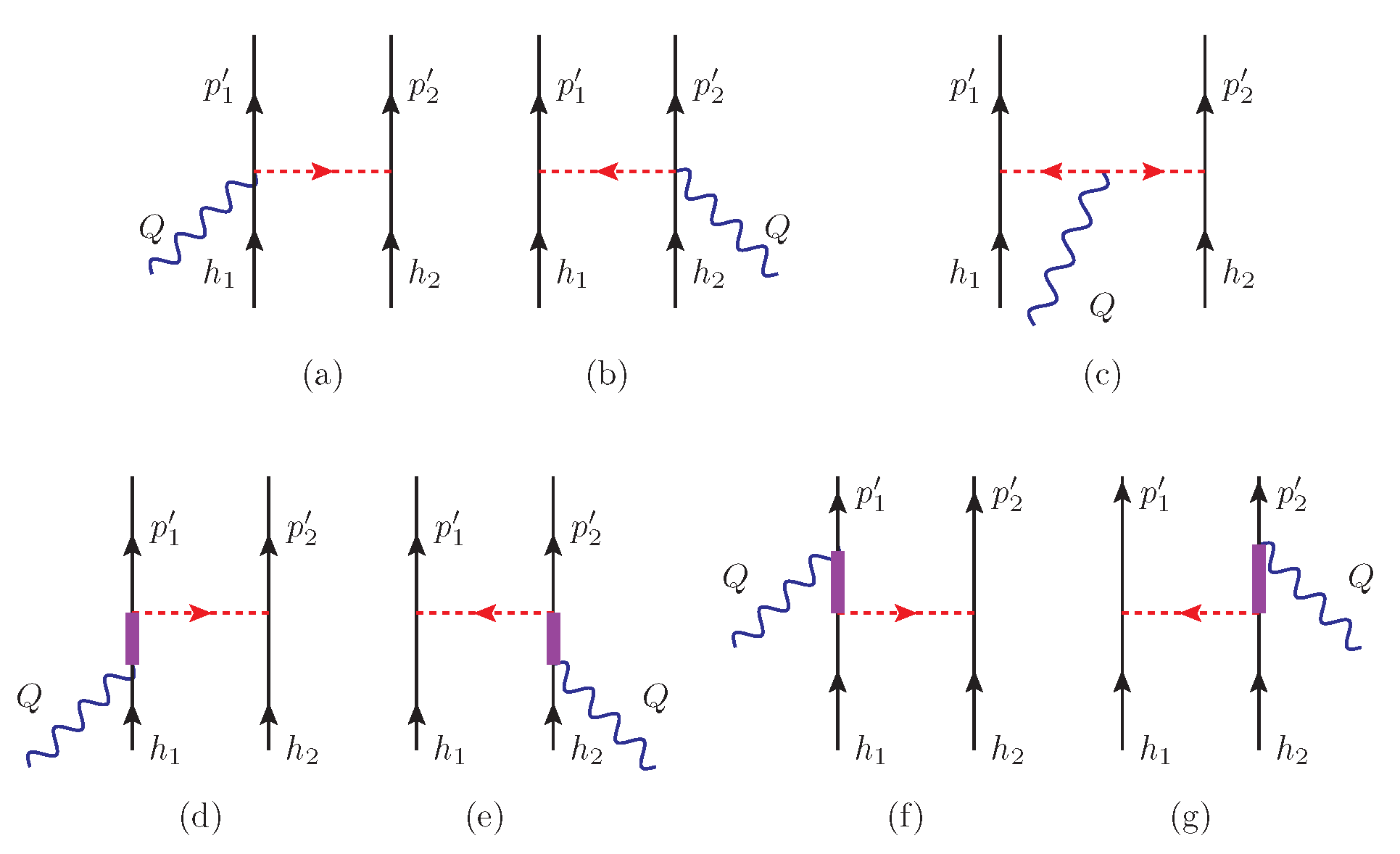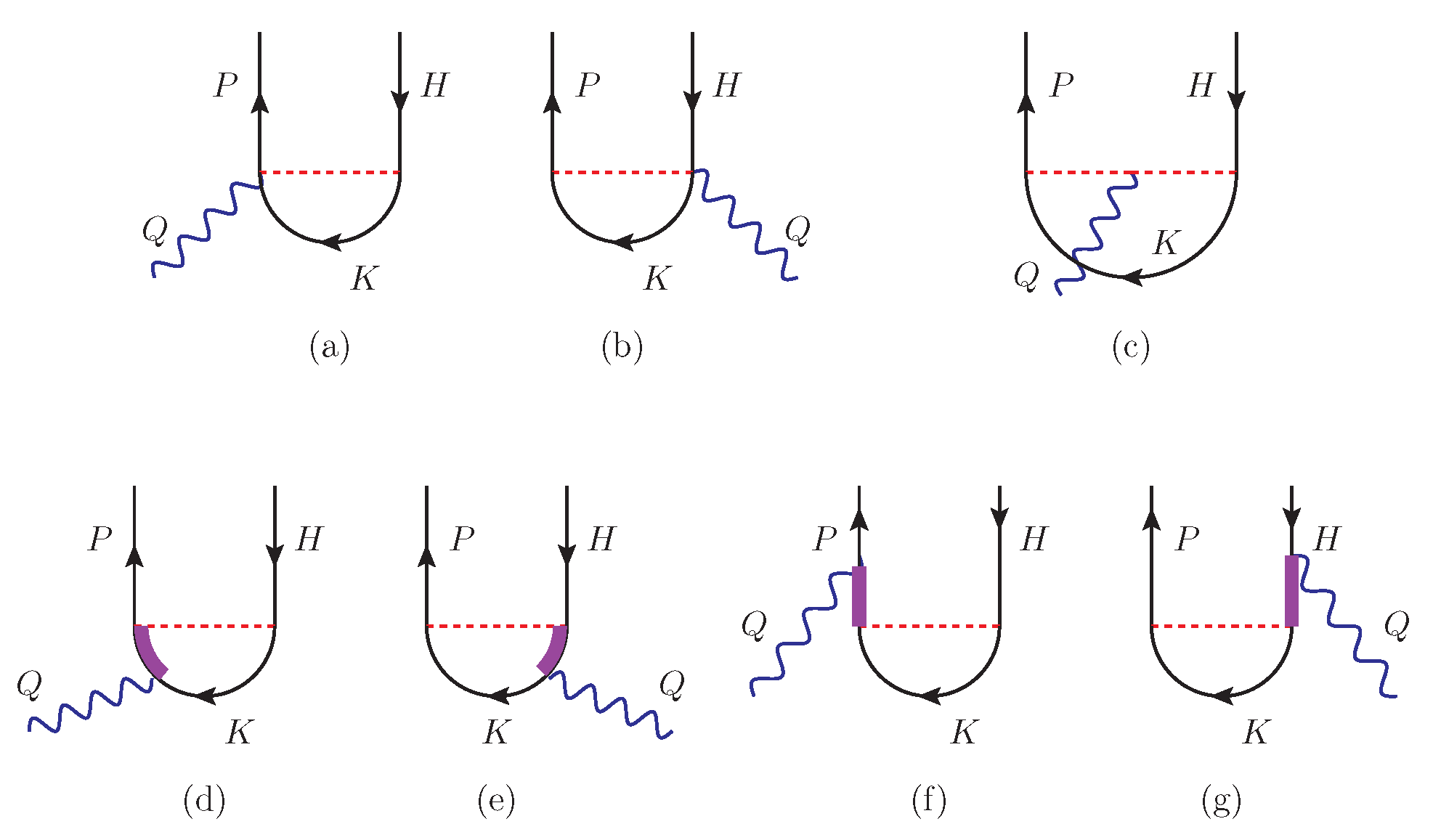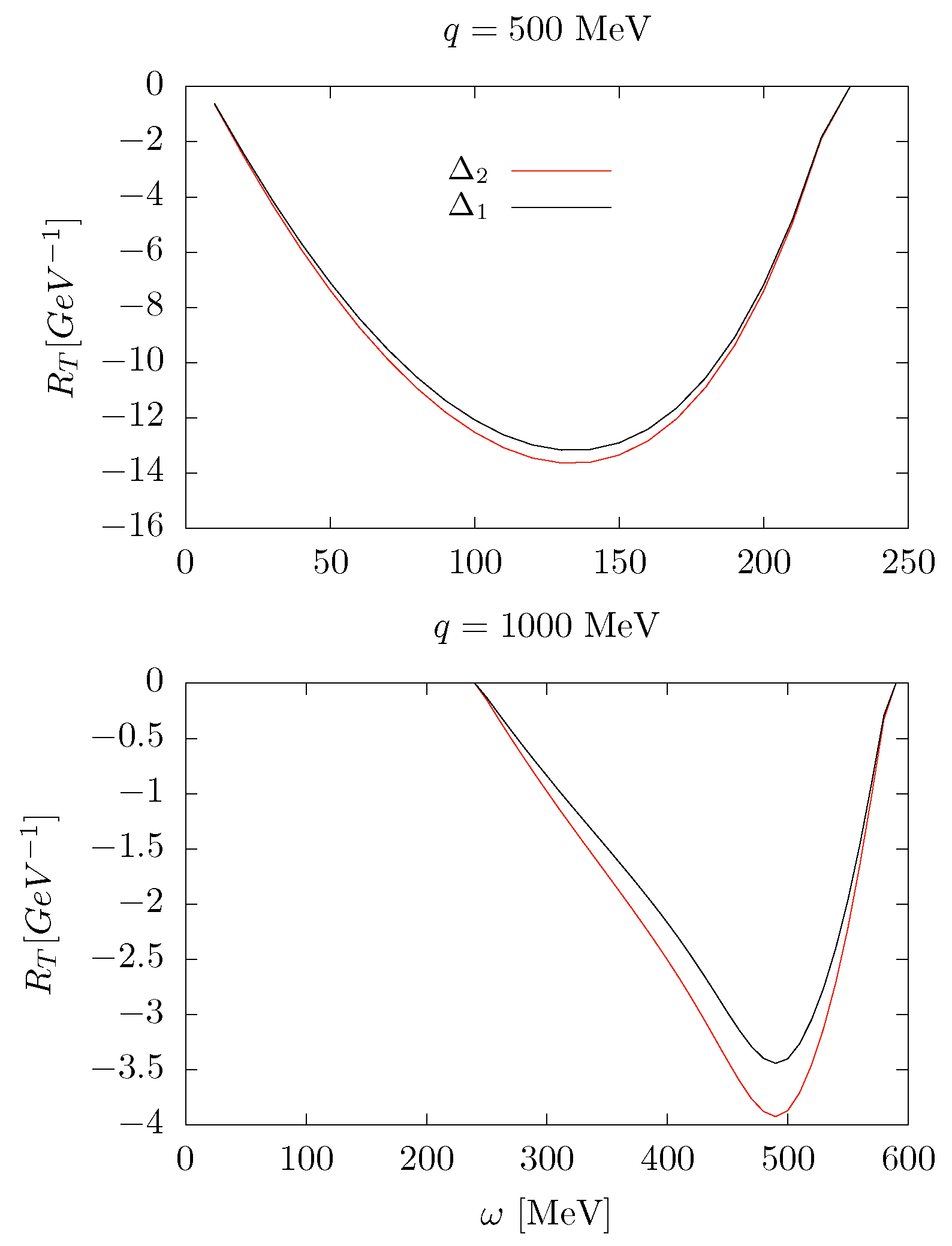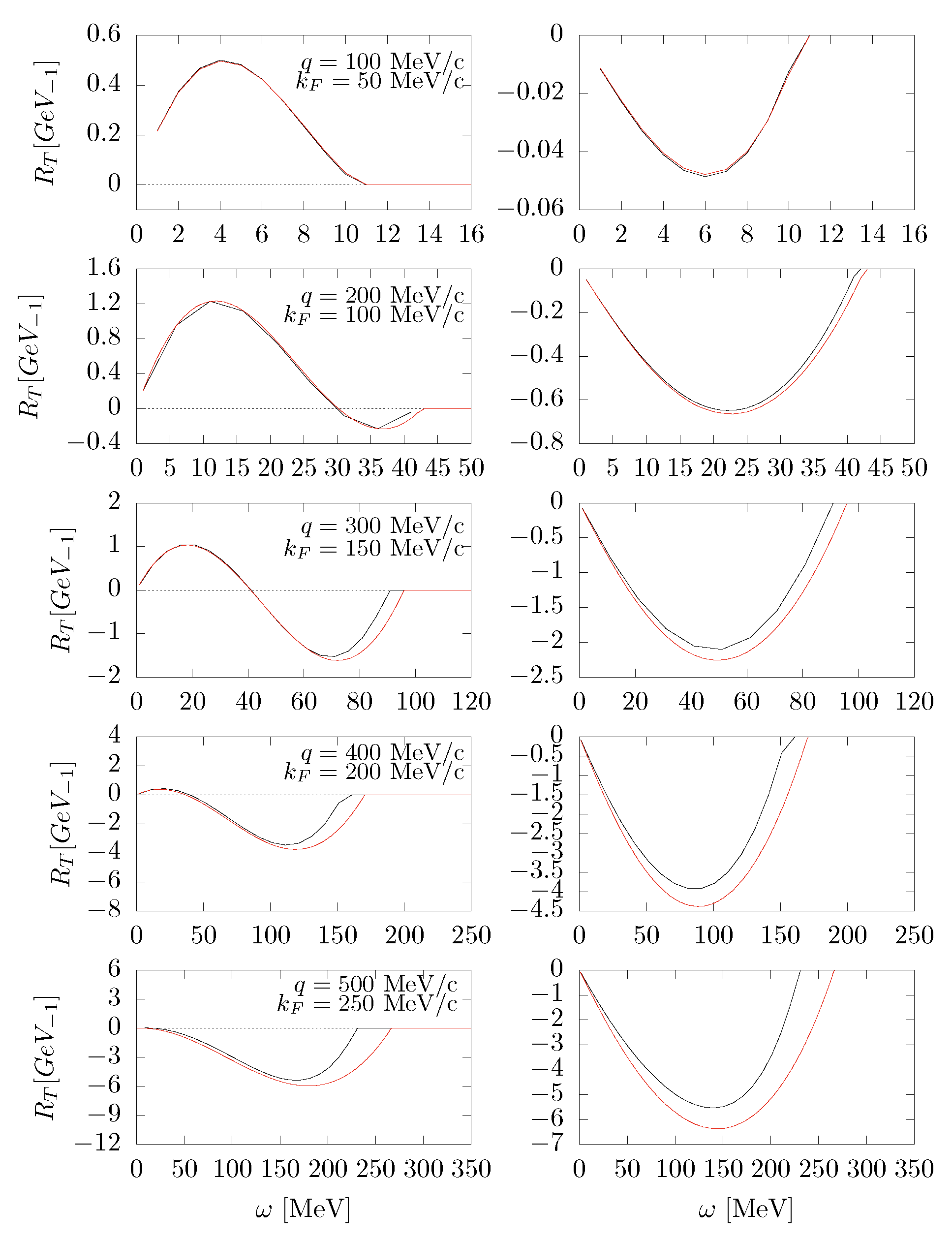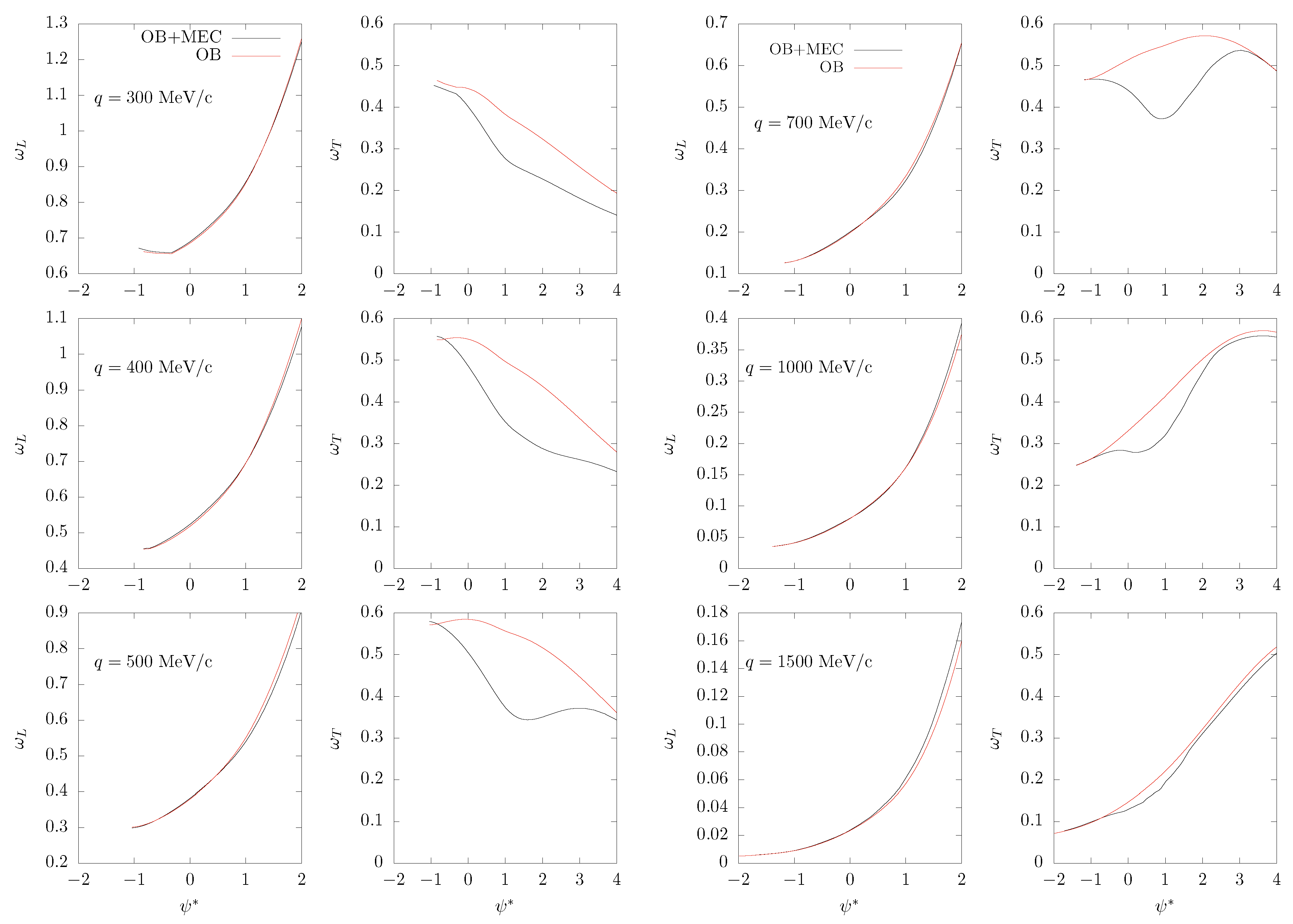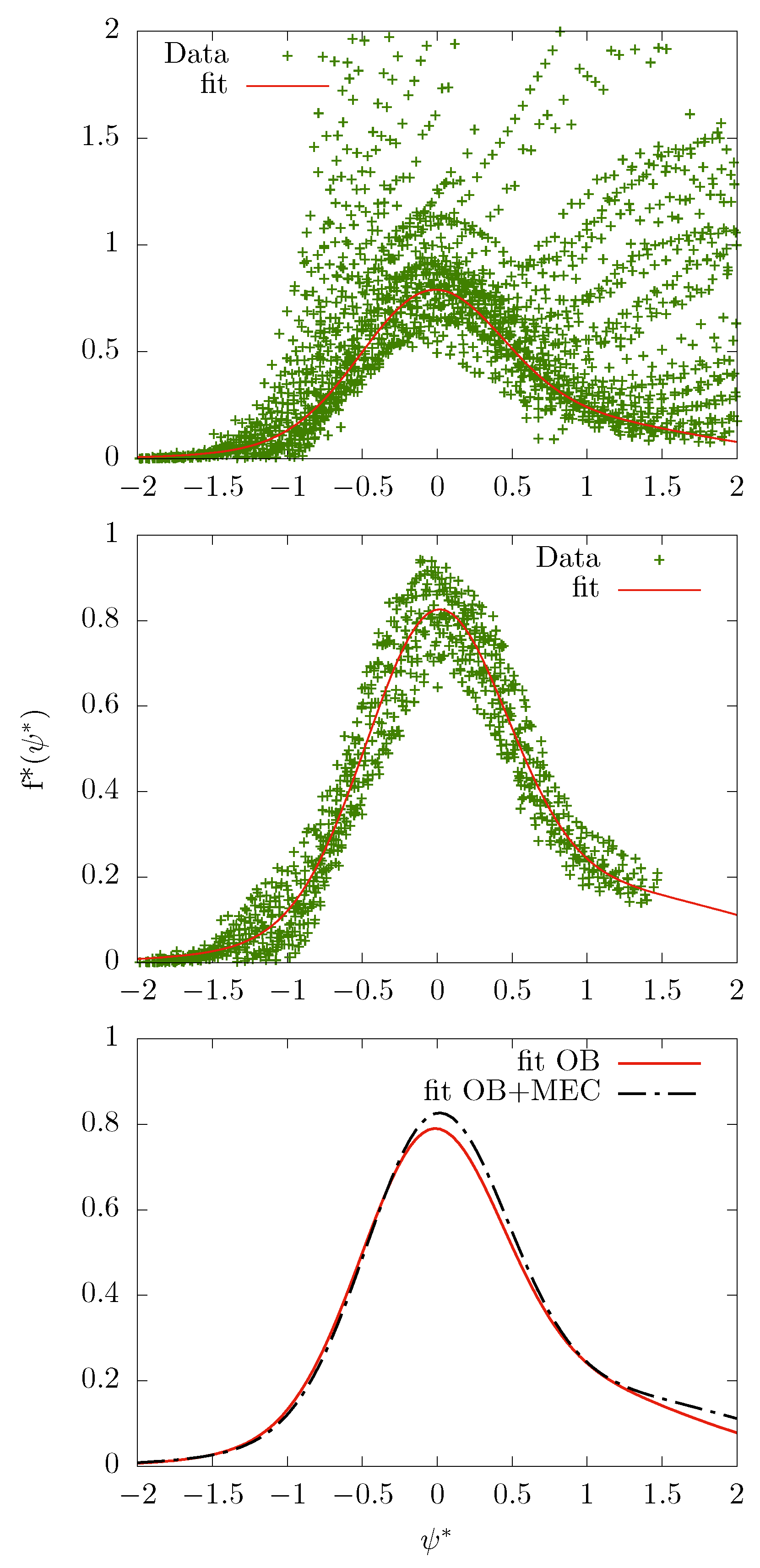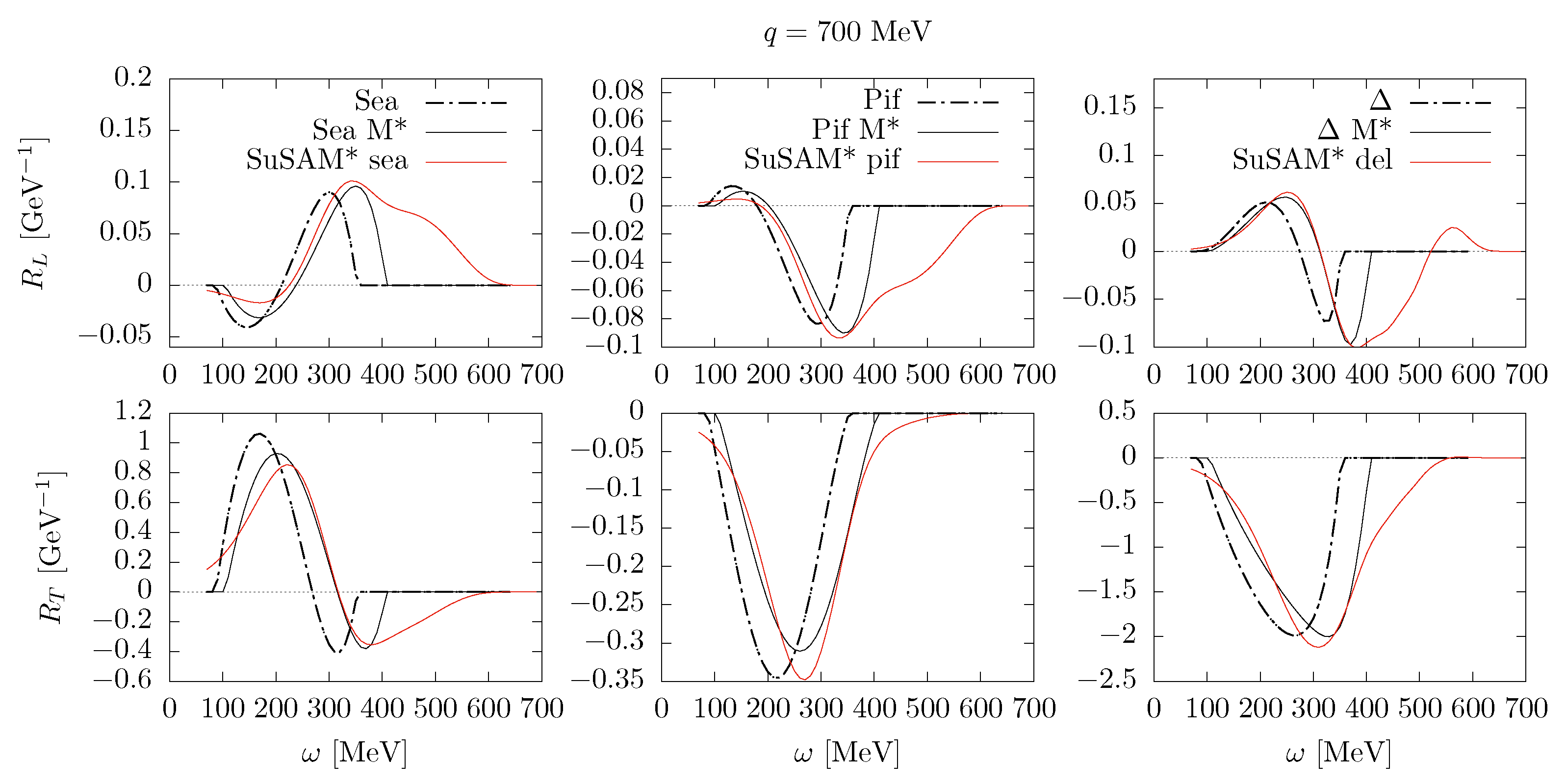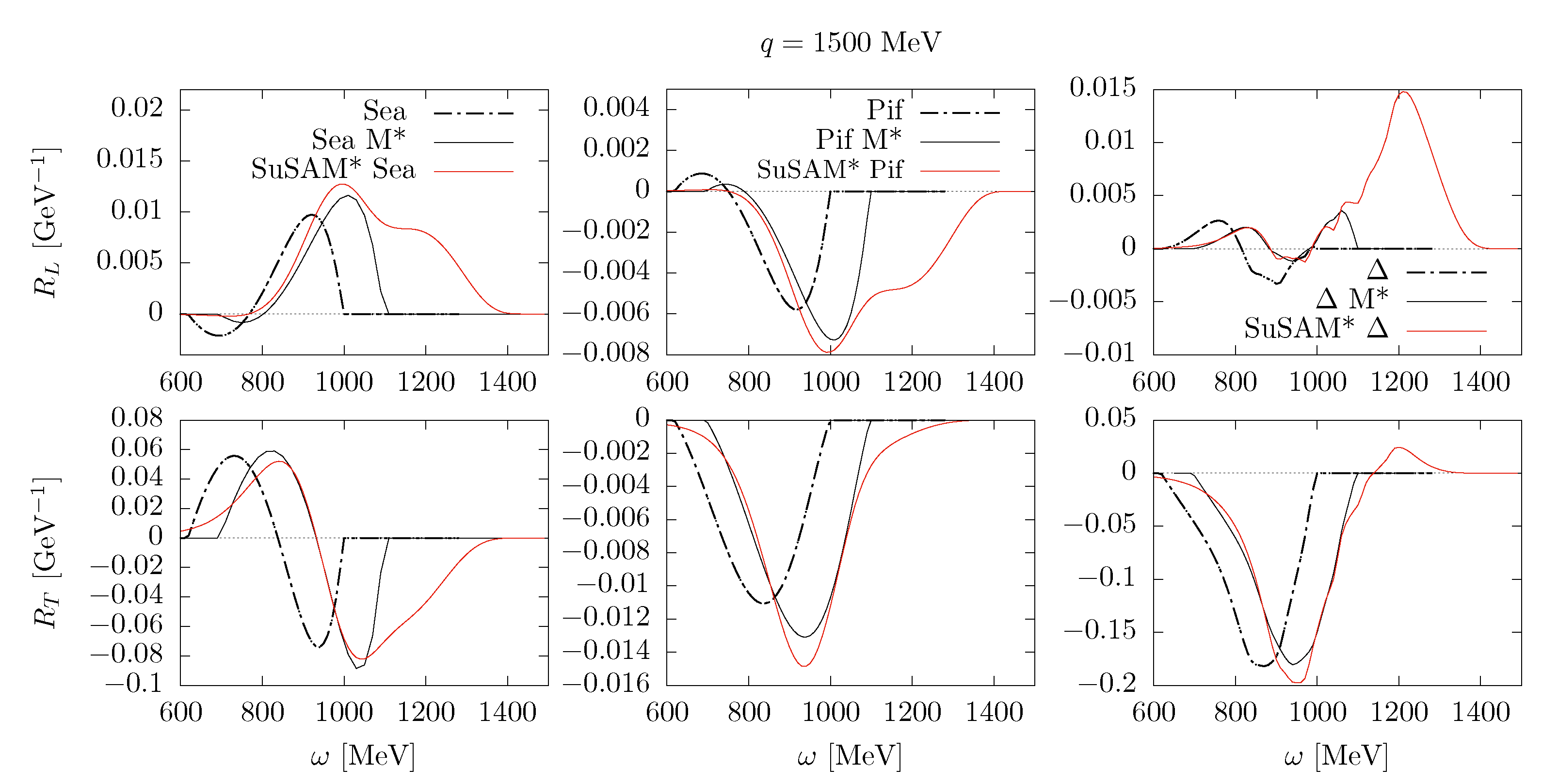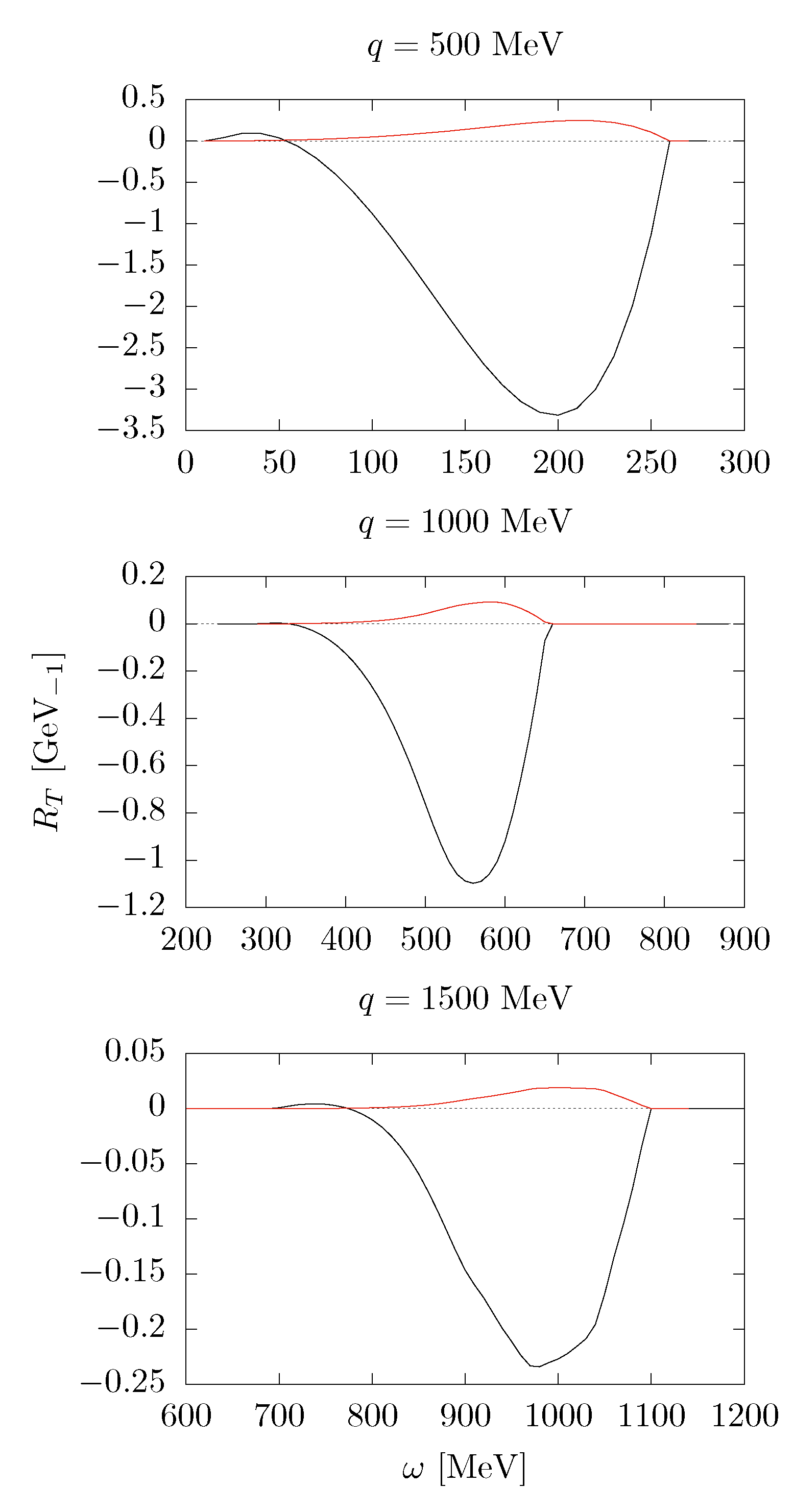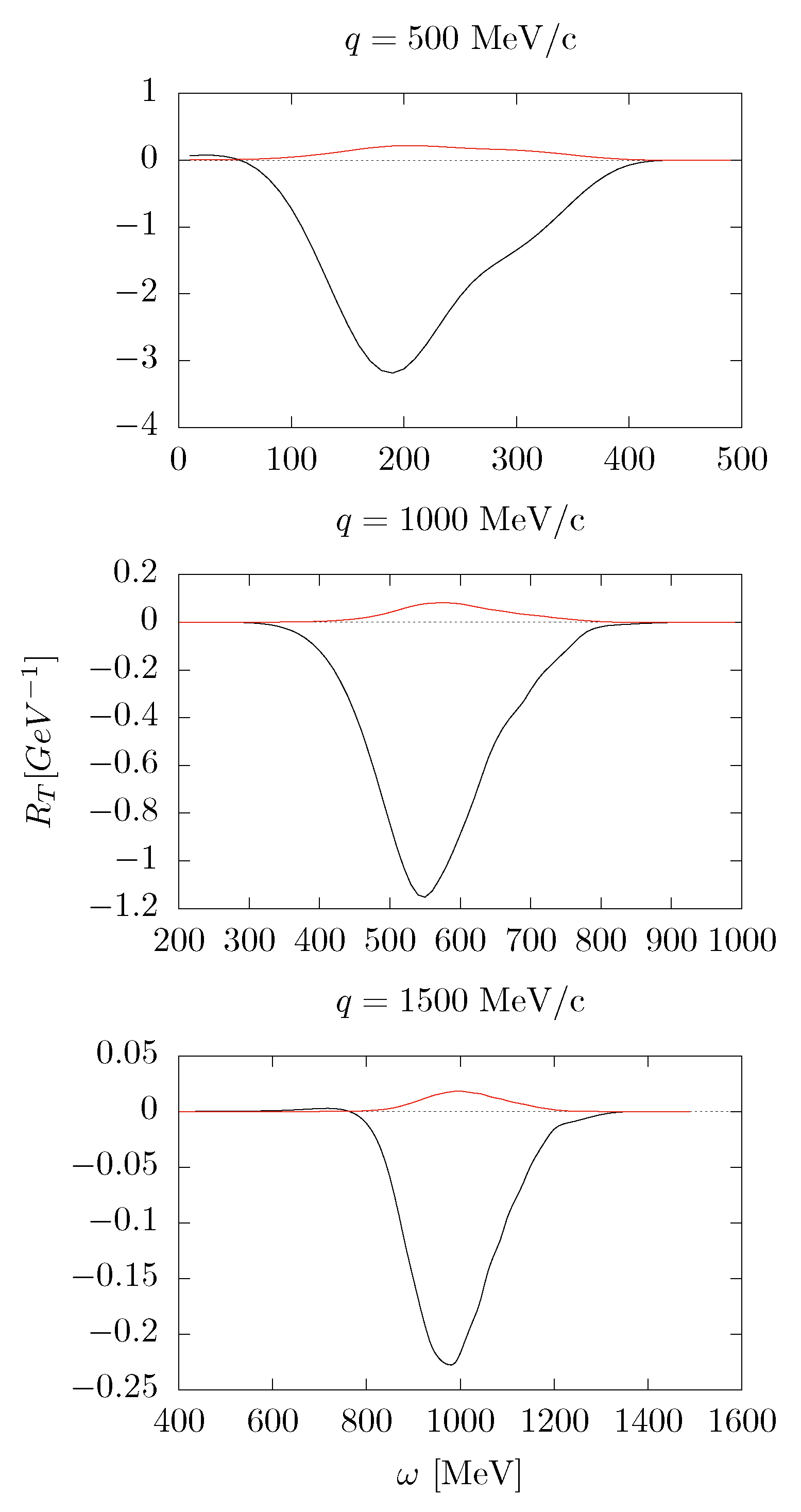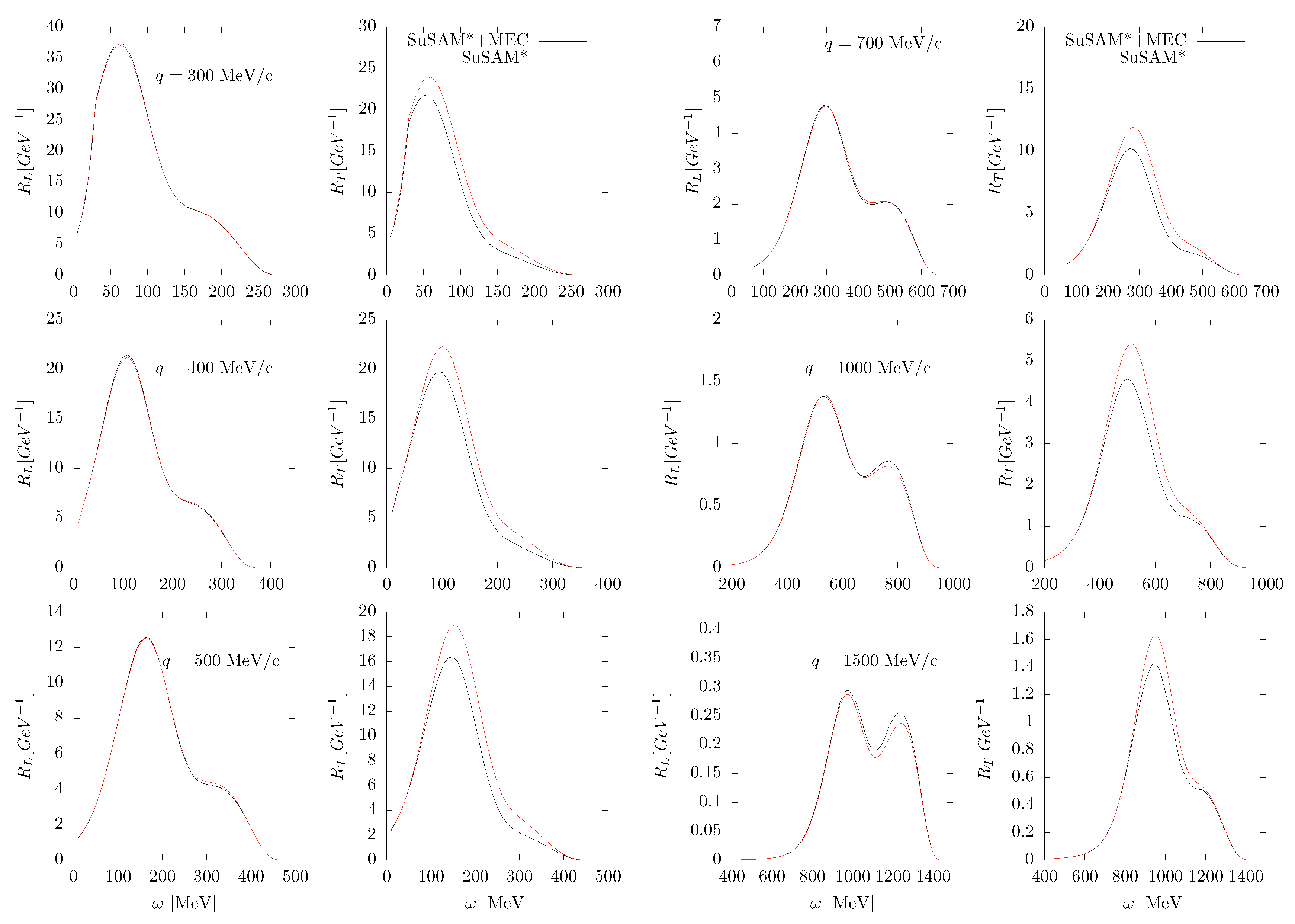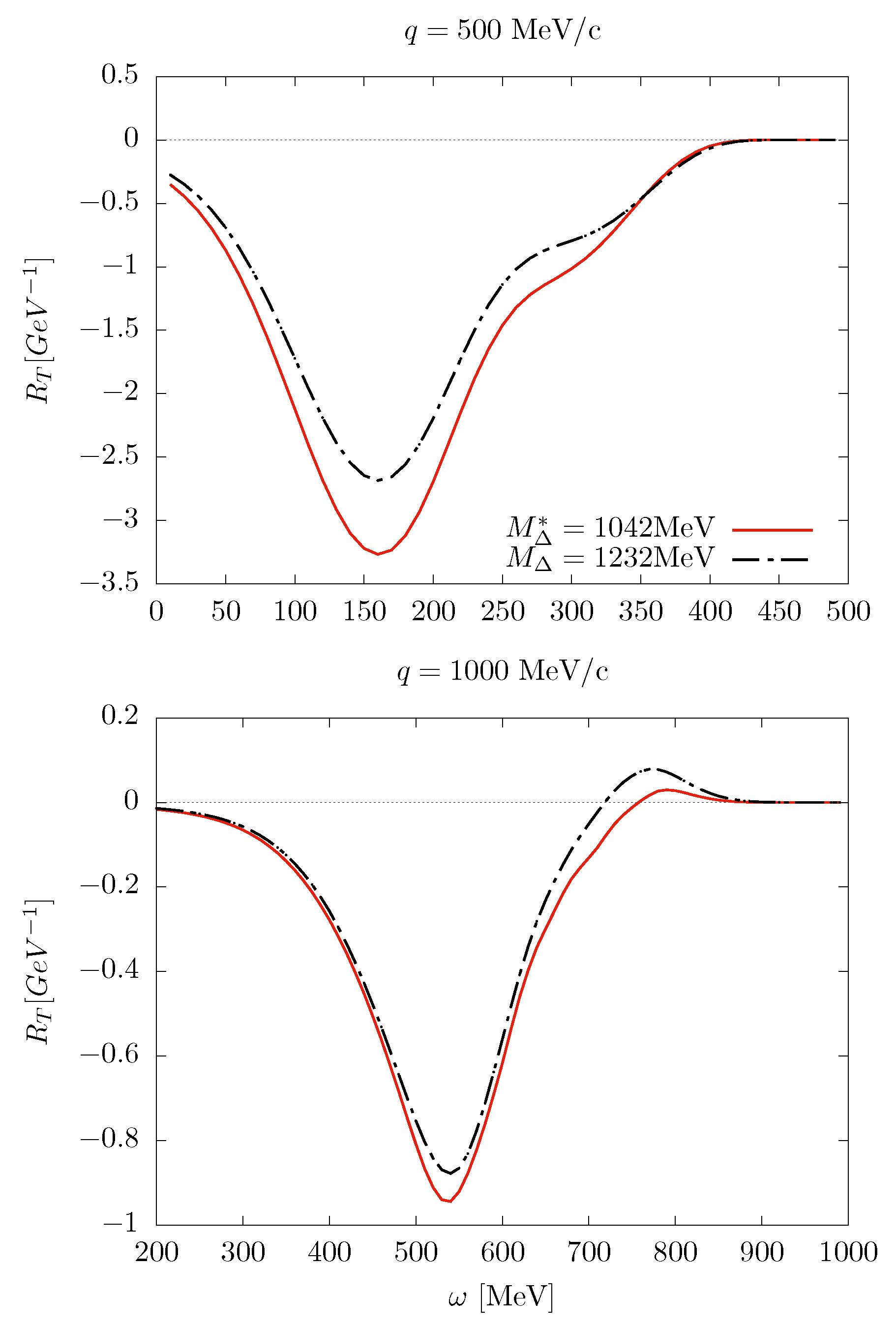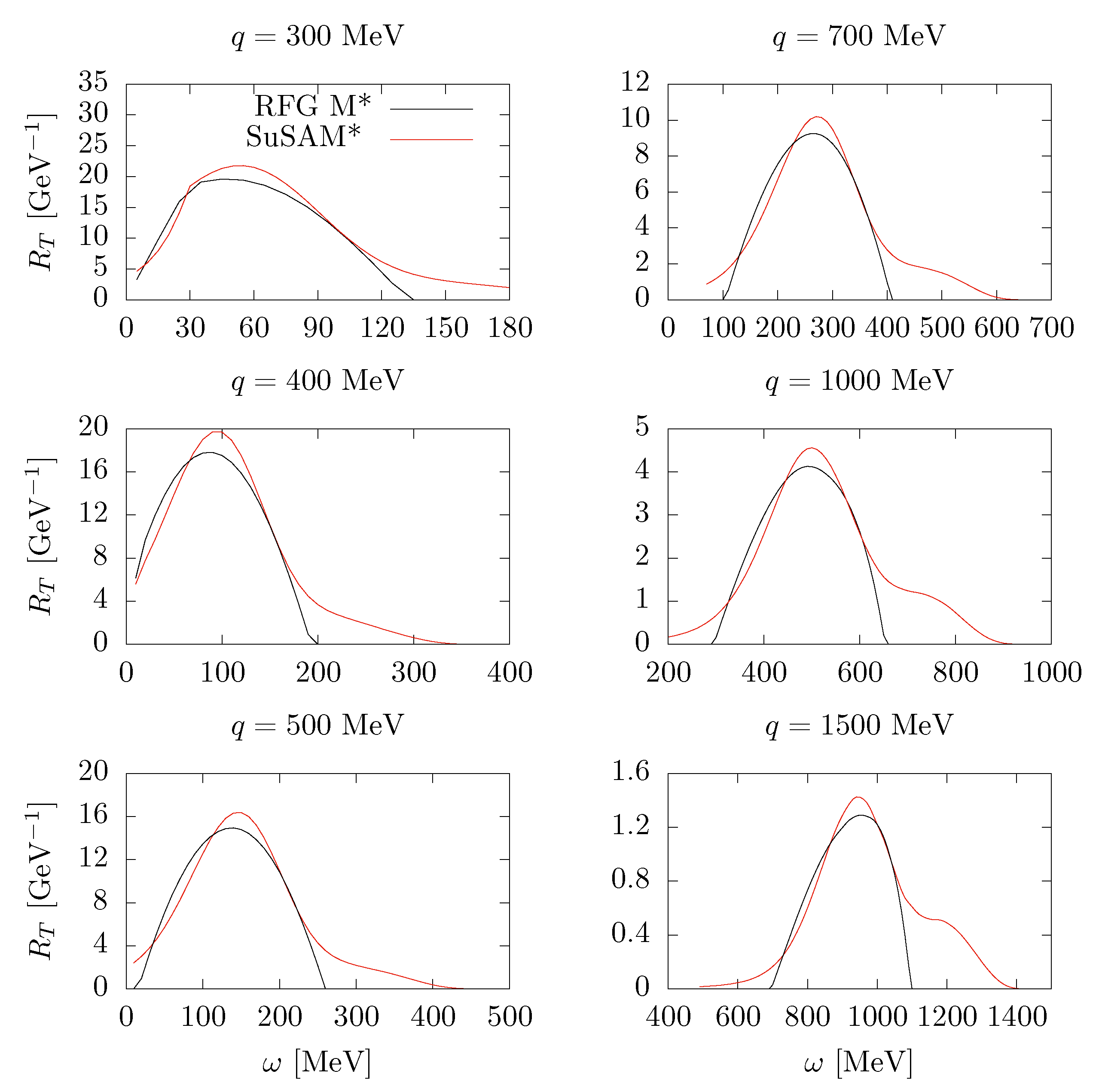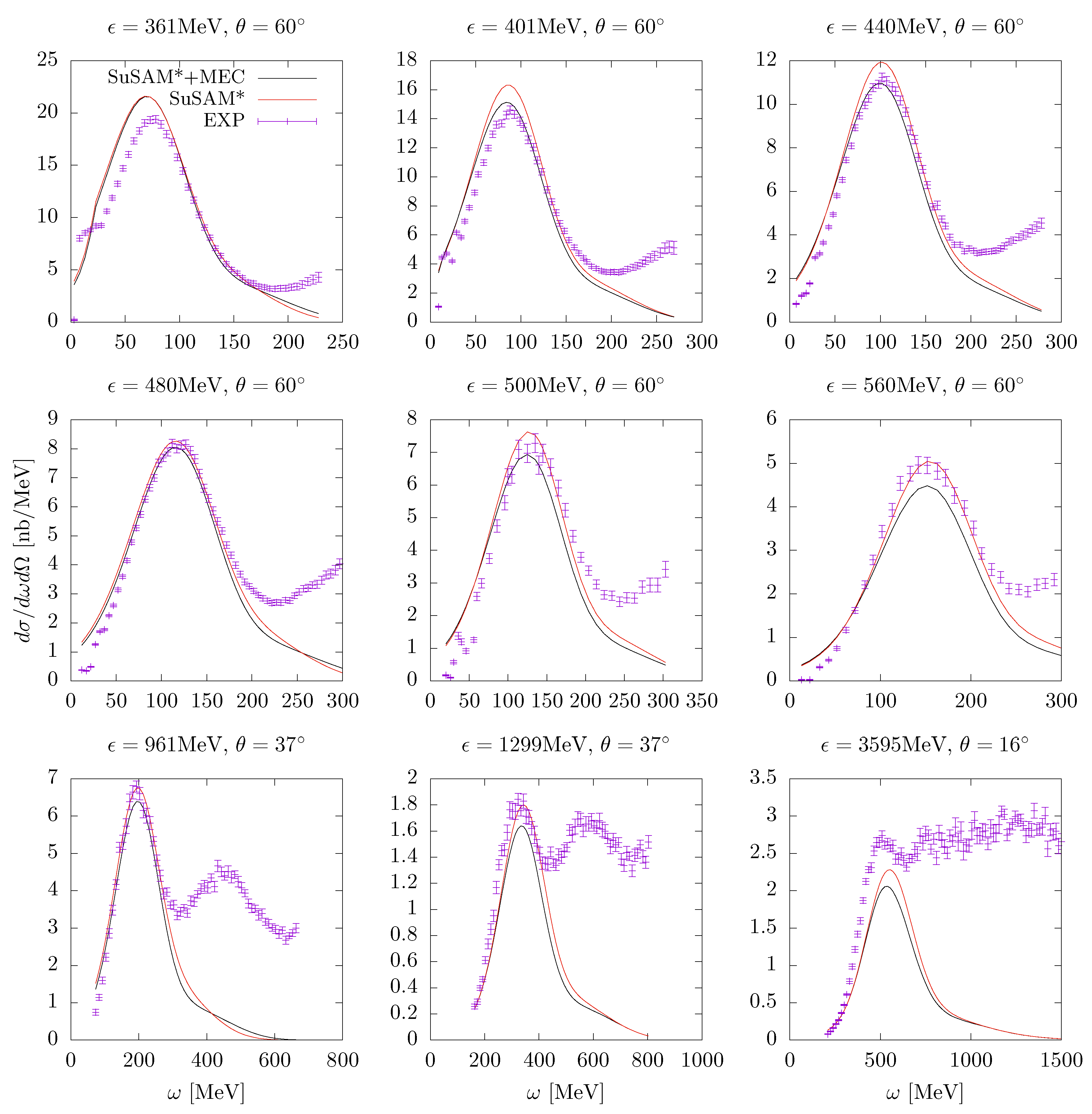1. Introduction
The pursuit of neutrino oscillation experiments represents a significant scientific endeavor, encompassing both experimental and theoretical efforts [
1,
2,
3,
4,
5,
6]. In particular, theoretical nuclear physics has been propelled to analyze neutrino-induced nuclear reactions in these experiments [
7,
8,
9,
10,
11,
12,
13,
14,
15,
16]. The ultimate goal is to minimize uncertainties arising from nuclear effects, which are a primary source of systematic errors when determining the neutrino interactions in detectors. Simultaneously, there has been a renewed interest in electron scattering studies [
17,
18,
19,
20,
21], as theoretical models can be calibrated using (e,e’) data and subsequently extended to neutrinos by incorporating the contribution of the axial current.
At typical energies around 1 GeV in many neutrino experiments, a significant contribution arises from quasielastic nucleon emission, which dominates at transferred energies around
, where
is the energy transfer,
, and
q is the momentum transfer to a nucleon with relativistic effective mass
[
22,
23,
24,
25,
26]. It is crucial to take into account that the transferred energies involved in neutrino experiments necessitate a relativistic treatment of the reaction. This requirement introduces significant challenges in constructing appropriate models for these interactions [
27,
28,
29,
30,
31].
In this article, we focus on the study of one-particle one hole (1p1h) transverse and longitudinal responses in the QE peak [
32,
33,
34], at intermediate and high momentum transfer, including the effect of meson exchange currents (MEC) for electron scattering. The MEC are two-body currents that involve the exchange of mesons between nucleons and virtual excitation of nuclear resonances. This can have a significant impact on the scattering cross section and on the distribution of energy and momentum transferred during the interaction. The emission of two particles (2p2h), stemming from MEC and short-range correlations, has emerged as a focal point in studies on lepton-nucleus scattering.
Extensive research has been dedicated to understanding its effects on the cross-section of both electron and neutrino interactions [
35,
36,
37,
38,
39,
40,
41,
42,
43,
44,
45]. However, it is often overlooked that MEC also contribute to the emission of a single particle (1p1h), thereby introducing interference effects with the one-body current. Notably, calculations have shown a reduction in the quasielastic transverse response compared to the impulse approximation when employing nuclear shell or Fermi gas models [
17,
33,
41,
46,
47,
48,
49]. This reduction is mainly due to the exchange part of the 1p1h matrix element of the
current.
In this work, we aim also to incorporate the effect of Meson Exchange Currents (MEC) consistently into the quasielastic peak within the framework of the relativistic effective mass Superscaling (SuSAM*) model [
50,
51]. This is an extension of SuSA model based on the approximation of factorizing the nuclear response into a single nucleon response multiplied by a superscaling function [
52]. The phenomenological superscaling function accounts for nuclear structure and reaction effects, as it is fitted to experimental data. The motivation behind scaling models arises from the observation that inclusive data, when divided by an appropriate single nucleon prefactor, approximately scale when plotted against a suitable scaling variable,
, extracted from the Relativistic Fermi Gas (RFG) model [
52]. The SuSA model [
13], along with its improved version SuSAv2, and SuSAM*, has been extensively utilized to analyze inclusive electron and neutrino scattering data [
15,
18,
53,
54,
55]. These efforts represent important strides in understanding and predicting neutrino-nucleus interactions. By establishing a phenomenological scaling function that successfully describes (e,e’) data, these models provide a valuable foundation for extrapolating to neutrino cross-sections.
The SuSAM* model builds upon the SuSA framework but incorporates the effective mass dependence from the Relativistic Mean Field (RMF) theory. A notable feature of the RMF model of nuclear matter (such as the Walecka or
model [
23]) is that it reproduces the (e,e’) cross-section better than the RFG model when an appropriate value for the effective mass M* is chosen [
22,
25,
56]. Motivated by this the SuSAM* model employs the RMF model’s scaling variable,
, and single nucleon prefactor dependent on the effective mass, with the aim to capture the essential dynamics associated with the interaction process more accurately. This approach capitalizes on the reasonable dynamical aspects embedded in the RMF model and offers an alternative description of the scaling behavior observed electron scattering cross section. It provides a comprehensive framework that combines the strengths of the RMF model and the superscaling formalism, leading to an improved understanding and interpretation of experimental data.
Until now, a unified model that incorporates 1p1h Meson Exchange Currents in the superscaling function had not been proposed. This was primarily due to the violation of scaling properties by MEC, even at the Fermi gas level [
32]. Additionally, the 1p1h matrix element of MEC is not easily extrapolated to the
region outside the range where the Fermi gas response is zero, as nucleons are constrained by the Fermi momentum. In this work, we address both of these challenges in a unified manner by modifying the scaling model to account for the contribution of MEC within the single nucleon prefactor. Furthermore, we take the opportunity to enhance the recently improved superscaling model by eliminating the extrapolation of single-nucleon responses averaged over the Fermi gas to the region
[
57]. Instead of extrapolation, we introduce a new approach where the single nucleon response is averaged with a smeared momentum distribution around the Fermi surface. As a result, the averaged single nucleon responses are well defined for all the values of
.
In the modified superscaling framework proposed in this work, the single nucleon response incorporates the contribution of MEC to the effective one-body current operator. This modification allows us to define a new prefactor that already includes the effects of MEC, enabling a novel scaling analysis of the data. Importantly, it should be noted that the Fermi gas now exhibits exact scaling behavior when utilizing the new single nucleon response: scaling violations associated to the MEC are exactly canceled by the dividing factor used to construct the scaling function. By incorporating these modifications, we overcome the limitations of previous models and provide a comprehensive framework that encompasses both MEC and modified superscaling effects. By consistently integrating 1p1h MEC within the SuSAM* model, we aim at refining our understanding of the underlying nuclear dynamics in the quasielastic peak. This comprehensive approach allows us to account for both the scaling behavior observed in inclusive data and the contributions from meson exchange currents, leading to a more accurate and comprehensive description of the reaction.
The article is structured as follows. In Sect. 2, we introduce the formalism of quasielastic electron scattering within the framework of the Relativistic Mean Field (RMF) model of nuclear matter, incorporating Meson Exchange Currents (MEC). In Sect. 3, we present our unified scaling model that incorporates MEC effects. We describe the modifications made to the conventional scaling approach to account for the contribution of MEC within the single nucleon prefactor. In Sect. 4 we present the results of our calculations and analyses based on the unified scaling model with MEC. Finally in Sect. 5 we present the conclusions drawn from our study.
3. Results
In this section, we present results for the effects of MEC on the 1p1h response functions using several models: the relativistic Fermi gas, the relativistic mean field, and the generalized SuSAM* model. By employing these different models, we take into account relativistic kinematics and we can analyze the impact of including the relativistic effective mass of the nucleon and the resonance appearing in the MEC. The scaling analysis described in the previous Section will allow us to study the influence of MEC on the generalized scaling function also in the region where the RFG and RMF responses are zero. Moreover, we can investigate how the inclusion of MEC affects the scaling function and compare it with the predictions of the RFG and RMF models.
Unless stated otherwise, we present the results for
C with a Fermi momentum of
MeV/c. We use an effective mass of
, following the same choice of parameters as in reference [
44,
45]. The calculation of 1p1h responses involves evaluating the 1p1h matrix element of the MEC, as given by Eq (15). This requires performing a numerical three-dimensional integration to account for the momentum dependence. Subsequently, a one-dimensional integration is carried out to calculate the averaged single-nucleon responses, as described in Eq (31).
First, since this work is an extension of the MEC model from Ref. [
33] to the superscaling formalism, we will compare with the OB-MEC interference responses presented in [
33] within the framework of the RFG. It should be noted that in [
33] a different version of the
current was used. The
current was obtained from the
Lagrangian proposed by Pascalutsa [
58]
plus
terms that give negligible contribution in the quasielastic energy region. The tensor
may contain an off-shell parameter and another arbitrary parameter related to the contact invariance of the Lagrangian. In this work we use the simplest form
The coupling constant
was determined in [
58] by fitting Compton scattering on the nucleon. However, there is a detail that needs to be clarified: the isospin operator used by Pascalutsa is normalized differently from the standard convention. That is,
, where
is the operator used in our calculation. This means that if we use the standard
in the Lagrangian (
61), it should be multiplied by
. This is equivalent to multiplying Pascalutsa’s coupling constant
by the factor
. In reference [
33], this detail went unnoticed, and the
factor was not included in the calculations.
Using the Lagrangian given by Eq. (
61), the following
current is obtained:
and a similar expression for the
backward current. This current was used in Ref. [
33] to compute the OB-MEC interference with the following form factor
where
is the electric form factor of the proton.
In
Figure 3, we present the interference between the OB and
currents in the transverse response of
Ca. We compare our results with the model of reference [
33] in RFG, where the Lagrangian of Pascalutsa was used. The results of [
33] have been corrected with the factor of
mentioned earlier. For
MeV/c, there is little difference between the two models. However, for
GeV/c, the difference becomes more noticeable.
The results of
Figure 3 show that the
current model used in this work does not differ significantly from the model in reference [
33], providing similar results. The small differences observed can be attributed to the different form factor and coupling constants, and can be understood as a model dependence in these results. From here on, all the results refer to the
current model described in the equations (,).
It is expected that any relativistic model should reproduce the results of the well-established non-relativistic model for small values of energy and momentum in the non-relativistic limit [
65]. As a check in this regard, in
Figure 4 we compare the present model with the non-relativistic Fermi gas model from ref. [
48]. The non relativistic
current used is taken from [
33]. To perform this comparison the same form factors and coupling constants are used in the relativistic and non relativistic models. To take this limit in
Figure 4, we follow the procedure as follows:
q is small and
. We show the comparison between the two models for various values of
q ranging from 100 to 500 MeV/c. In the left panels, we present the contribution of the transverse response stemming from the interference OB-
between the pure pionic MEC (diagrams a-c in
Figure 2) and in the right panels we show the OB-
interference (diagrams d-g in
Figure 2) for the same values of
q. As expected, we observe that for
MeV/c, the relativistic and non-relativistic models practically coincide, demonstrating the consistency between the two models in the non-relativistic limit.
In
Figure 4 one can also observe that for low values of
q the dominant contributions to the MEC are from the seagull and pion-in-flight diagrams, with the seagull diagram playing a particularly important role. These diagrams contribute positively to the MEC, enhancing the overall response. On the other hand, the contribution from the
resonance is negative. As
q increases, the influence of the
resonance becomes more significant, and it starts to dominate the MEC contribution for
q values around 400 MeV/c.
Before performing the scaling analysis, we examine the averaged single-nucleon responses that will be used to scale the data. In
Figure 5, we display the longitudinal and transverse single-nucleon responses for various values of
q as a function of the scaling variable. The calculated responses are shown separately for the OB current and the total responses including the MEC and taking into account the sum of protons and neutrons. The total response, which we have defined in equation (
36), comes from the product of the single nucleon with the phenomenological scaling function obtained from the
data as shown below. We have used a Fermi distribution, Eq.(
37), with a smearing parameter
, although the single nucleon responses do not depend much on this specific value. It is observed that the effect of the MEC is negligible in the longitudinal response, as the curves for the OB current and total response overlap. However, in the transverse response, the effect of the MEC becomes appreciable, resulting in a reduction of the
response compared to the OB current. This reduction can be attributed to the interference between the one-body and two-body currents, which leads to a modified transverse response. The comparison between the OB current and the total response including the MEC provides insights into the contributions of the MEC to the single-nucleon responses and sets the stage for the subsequent scaling analysis.
Note that the center of the quasielastic peak corresponds to , where the energy and momentum can be transferred to a nucleon at rest. We see that MEC have a larger impact in the region , that is, the right-hand side of the peak, corresponding to higher energy transfers.
In
Figure 6, we present the scaling analysis of the
C data. In the top panel, the experimental data,
, are plotted against
in the interval
. Experimental data are from Refs. [
66,
67] and cover a wide electron energy range, from 160 MeV up to 5.8 GeV. We observe a significant dispersion of many data points, indicating a wide range of inelastic scattering events. However, we also notice that a portion of the data points cluster together and collapse into a thick band. These data points can be considered as associated to quasielastic (1p1h) events. To select these quasielastic data, we apply a density criterion. For each point, we count the number of points,
n, within a neighborhood of radius
, and eliminate the point if
n is less than 25. Points that have been disregarded are likely to correspond to inelastic excitations and low energy processes that violate scaling and cannot be considered within quasielastic processes. We observe that the remaining selected points, about half of the total, shown in the middle panel of
Figure 6, form a distinct thick band. These points represent the ones that best describe the quasielastic region and approximately exhibit scaling behavior. The red curve represents the phenomenological quasielastic function
, that provides the best fit to the selected data using a sum of two Gaussian functions:
The parameters found are shown in
Table 1.
In the bottom panel of
Figure 6 we compare the scaling function obtained in our analysis with the scaling function obtained without including the MEC contributions. When including the MEC, the scaling function appears slightly higher since the single-nucleon response with MEC is slightly smaller than without them. However, both analyses provide a similarly acceptable description of the data. This suggests that while the MEC do have an impact on the scaling behavior, their effect is relatively small and does not significantly alter the overall scaling pattern observed in the data.
Now that we have obtained the phenomenological scaling function through the scaling analysis, we can utilize this function to calculate the response functions of the model beyond the RMF. By multiplying the scaling function by the averaged single nucleon responses, as stated in Eq (36), we can extend our calculations to different kinematic regimes and explore the behavior of the responses beyond the relativistic mean field description. This allows us to investigate the influence of various factors, such as the MEC and relativistic effects, on the response functions and cross sections.
In
Figure 7,
Figure 8,
Figure 9 and
Figure 10, we present the interferences of the OB-MEC in the response functions for different values of
q (500, 700, 1000, and 1500 MeV/c). We separate the interferences into OB-seagull, OB-pionic, and OB-
contributions for both the longitudinal and transverse responses as functions of
. Each panel displays three curves corresponding to the free RFG (with effective mass
), the RMF (with effective mass
), and the present SuSAM* model. These figures allow us to analyze the relative contributions of the different OB-MEC interferences in the response functions at various kinematic regimes. By comparing the results obtained from the RFG, RMF, and SuSAM* models, we can observe the effects of including the relativistic interaction through the effective mass and the scaling function on the interferences.
First is observed that the introduction of the effective mass shifts the responses to the right, towards higher energy values. The effective mass takes into account the binding of the nucleon in the nucleus, which causes the quasielastic peak to approximately coincide with the maximum of the experimental cross section. In the RFG, this is traditionally taken into account by subtracting a binding energy of approximately 20 MeV from to account for the average separation energy of the nucleons. In the RMF, this is automatically included by considering the effective mass of the nucleon, , which was adjusted for C precisely to achieve this effect.
In the transition from the RMF to the SuSAM* model, we replace the scaling function of the RFG with the phenomenological scaling function that we have adjusted. This new scaling function extends beyond the region of
, where the RFG scaling function is zero. As a result, we observe in
Figure 7,
Figure 8,
Figure 9,
Figure 10 and
Figure 11 that the interferences acquire a tail towards high energies, similar to the behavior of the scaling function.
The tail effect is more pronounced in the longitudinal responses because the single-nucleon longitudinal response, as shown in
Figure 5, increases with
. This amplifies the tail when multiplied by the scaling function. However, it is important to note that the contribution of the MEC to the longitudinal response is relatively small compared to the dominant transverse response. Therefore, while the tail effect is observed in the longitudinal responses, its impact on the cross section is not as significant as in the transverse channel, if not negligible.
In the dominant transverse response, the seagull contribution from the MEC is positive, leading to an enhancement of the response, while the pionic and
contributions are negative, causing a reduction in the overall response when including the MEC. This is in line with pioneering calculations by Kohno and Otsuka [
46] and by Alberico
et al. [
47] in the non-relativistic Fermi gas. Also in shell model calculations, similar results have been obtained [
48], showing that the MEC contributions also lead to a tail and extension of the response functions to higher values of
, as in the SuSAM* approach. It is worth noting that the relative importance of these contributions can depend on the momentum transfer
q and the energy transfer
. For the values considered in
Figure 7,
Figure 8,
Figure 9,
Figure 10 and
Figure 11, the
current is found to be the dominant contribution, leading to a net negative effect from the MEC.
The observation in
Figure 10 of a sign change and a small bump in the OB-
transverse response for high values of
is indeed interesting. The change of sign is already observed for
q=1 GeV/c in
Figure 9. This connects with the findings in reference [
17], where a pronounced bump and sign change were reported in a semi-relativistic shell model calculation based on the Dirac equation with a relativistic energy-dependent potential. In the present calculation the bump is observed but it is very small compared to the results of Ref, [
17]. It is important to note that, in the present work, the fully relativistic SuSAM* approach is employed, which takes into account the dynamical properties of both nucleons and the
, as well as the scaling function. This differs from the approach in reference [
17], where a static propagator for the
was used. To definitively clarify the difference with the present results, a fully relativistic calculation in finite nuclei, considering the dynamical properties of the
would be necessary.
The comparison of the OB-MEC interference with the MEC contribution alone (represented by
and
, respectively in Eq, (21)) in the transverse response is shown in
Figure 11 and
Figure 12. We observe that the MEC contribution alone represents a small and almost negligible contribution to the transverse response. This justifies the previous calculations that focused only on the OB-MEC interference (e.g., the semi-analytical calculations in references [
48,
68] for the non-relativistic Fermi gas), as it provides an excellent approximation. This observation holds true for both the RMF model in
Figure 11 and the SuSAM* model in
Figure 12. It highlights the fact that the dominant contribution to the transverse response arises from the interference between the OB and MEC, while the pure MEC contribution is relatively small. It is also worth stressing that while the pure MEC contribution is, of course, positive, the interference contribution is negative.
In
Figure 13, we present the total responses of
C computed using the generalized SuSAM* model. These responses are obtained by multiplying the phenomenological scaling function by the averaged single-nucleon response and summing over protons and neutrons, as given by Eq. (36). The responses are shown for different values of
q as a function of
. In the same figure, we also show the results without including the MEC contributions, which corresponds to setting the terms
associated with the two-body current (Eq. (21)) to zero.
Comparing the results with and without MEC, we observe that the impact of MEC is more significant in the transverse response compared to the longitudinal response. This is expected since the corrections due to MEC in the longitudinal response are higher-order effects in a non-relativistic expansion in powers of
, as known from previous studies [
69]. Therefore, the MEC contributions to the longitudinal response are minimal and only start to become noticeable for
1 GeV in the high-energy region. However, this high-energy region is dominated and overshadowed by pion emission and inelastic processes, making it difficult to isolate the 1p1h longitudinal response.
The inclusion of MEC in the single-nucleon leads to a reduction of the transverse response by around 10% or even more for all studied values of
q. This is consistent with previous calculations in RFG and the shell model [
17,
33,
48,
70,
71]. These calculations have consistently shown that MEC in the 1p1h channel tend to decrease the transverse response compared to the contribution from the one-body current. It is important to note that this reduction in the transverse response is a direct consequence of the destructive interference between the one-body current and MEC. The contribution of MEC to the transverse response is negative because the direct two-body matrix element is zero (in symmetric nuclear matter,
) or almost zero (in asymmetric nuclear matter,
, or in finite nuclei) after summing over isospin.
The treatment of the
resonance in the medium is subject to various ambiguities and uncertainties. In our generalized SuSAM* model, we have assumed that the
resonance acquires an effective mass
and vector energy
due to its interaction with the RMF. This requires modifying the propagator according to the formalism proposed in references [
25,
64]. To estimate the effect of this treatment, in
Figure 14 we compare the transverse response for the OB-
interference calculated assuming that the
remains unchanged in the medium, i.e., setting
and
. The response with the free
without medium modifications is slightly smaller in absolute value, around 10% depending on the momentum transfer. This can be seen as an estimation of the uncertainty associated with the
interaction in the medium.
Another related issue is the modification of the
width in the medium, which we have not considered here assuming the free width (
59). This effect can also influence the results, but it is expected to be of the same order as the observed effect in
Figure 14. It is important to note that the treatment of the
resonance in the medium is a complex topic, and further investigations and refinements are needed to fully understand its effects and uncertainties.
In
Figure 15, we compare the total transverse response calculated in the RMF model with an effective mass of
to the results obtained in the generalized SuSAM* approach for various momentum transfers, ranging from
MeV/c to
MeV/c. Both calculations include the effects of MEC. One notable difference between the two approaches is the presence of a pronounced tail at high energy transfer rates in the SuSAM* results. This tail extends well beyond the upper limit of the RFG responses, reflecting the effect of the phenomenological scaling function used in the SuSAM* approach. Similar effects are found in the longitudinal response. Additionally, it is worth noting that the peak height of the transverse response in the SuSAM* approach is generally higher compared to the RMF model. Overall, the comparison in
Figure 15 highlights the improvements and additional physics captured by the SuSAM* approach, by extending the scaling function of the RFG to describe the transverse response in a wider energy transfer range.
Finally, in
Figure 16, we present the results for the (e,e’) double differential cross section of
C calculated with the generalized SuSAM* model including MEC, compared to experimental data for selected kinematics. We also compare with the same model but assuming that only the single-nucleon contribution is present, i.e., setting the MEC to zero. We observe that the inclusion of MEC in this model leads to a small reduction in the cross section compared to the case without MEC. This reduction is a consequence of the decrease in the transverse response due to the presence of MEC. The generalized scaling approach, including the inclusion of MEC, provides a global description of the cross section that is comparable to other previous analyses, such as the SuSAM* model with the one-body current only, or the SuSAv2 model, which factorize different definitions of the single nucleon (without effective mass and with extrapolation of the Fermi gas single nucleon in the case of SuSAv2). All of these approaches reasonably describe the quasielastic cross section because the scaling function has been properly adjusted to reproduce the global scaling data. The generalized scaling approach, like any parametrization, is a phenomenological framework that aims to capture the essential physics of the reaction. It provides a functional form for the cross section that incorporates the known ingredients and leaves the unknowns to be determined by the scaling function. The scaling function encapsulates the effects of various dynamical and correlation effects, allowing for a global description of the data.
4. Discussion and concluding remarks
From the results seen in the previous section we have observed that, in all the models considered, the transverse response decreases when including meson exchange currents in the 1p1h channel. This result is consistent with previous independent calculations performed in the relativistic and non-relativistic Fermi gas models as well as in the non-relativistic and semi-relativistic shell models. The result is a consequence of the fact that the main contribution arises from the interference of the OB and currents, in particular through the exchange diagram, carrying a minus sign. The contribution from the direct part of the MEC matrix element is zero in the Fermi gas, and this is the reason for the negative contribution.
It is worth mentioning the existence of some calculations that disagree with this result and suggest a different effect of MEC on the transverse response. We would like to comment in particular on two notable model calculations: the Green Function Monte Carlo (GFMC) model from reference [
72] and the Correlated Basis Function (CBF) calculation by Fabrocini [
70], both including meson exchange currents in the 1p1h sector. In both approaches, the effect of MEC is positive in the quasielastic peak and quite significant, around 20%, in the transverse response. This substantial effect is attributed to the simultaneous effect of tensor correlations in the wave function and MEC. In fact, in Fabrocini’s calculation, the origin of this effect was found to be the tensor-isospin correlation contribution in the direct matrix element of the
current, which is non-zero when summing over isospin for correlated wave functions. This effect can also be understood in terms of presence of short-range correlations in the nuclear wave function. The direct matrix element of MEC, when a proton is emitted, involves the interaction of the proton with protons as well as with neutrons, i.e., the MEC matrix element involves PN and PP pairs. The high-momentum component of these pairs is significantly different because PN pairs contain the
and
deuteron-like waves, while PP pairs do not. Therefore, when summing over isospin, there is no cancellation between PP and PN pairs in the high-momentum part of the wave function, resulting in a non-zero direct matrix element. This is in agreement with the conclusion of Fabrocini, as the tensor-isospin term precisely generates this significant difference between PP and PN pairs. An alternative way to investigate this hypothesis would be to perform calculations in the independent particle model by solving the Bethe-Goldstone equation [
73] for PP and PN pairs and using a correlation current similar to the one proposed in [
74]. Such calculations could provide further insights into the effect of short-range correlations on the MEC contributions to the transverse response.
On the other hand the results of Fabrocini reproduce the well-known effect that MEC has a negative impact on the transverse response when the correlations functions are set to zero, consistent with the results from uncorrelated models. Since in the present work we started with an uncorrelated model, the relativistic mean field, the effects of correlations in the transverse current are expected to be included phenomenologically in the scaling function. This and other mechanisms, such as final state interactions, contribute to the violation of scaling observed in the data.
To summarize, this work presents a generalized scaling analysis of the (e,e’) cross section of C, including the MEC consistently in the formalism. To achieve this, we have introduced a new definition of the single nucleon tensor in the factorization of the model. The average per particle of the hadronic tensor for 1p1h emission has been defined by considering the sum of the one-body and two-body currents, without modifying the definition of the scaling function, which remains the same as in the one-body current case in the Fermi gas. This averaging definition has been extended beyond the scaling region of the Fermi gas by slightly modifying the momentum distribution with a smeared Fermi distribution that allows the evaluation of MEC for any value of the scaling variable.
By incorporating the MEC and using the phenomenological scaling function, we have calculated the 1p1h response functions in the RFG, RMF, and SuSAM* models. The results show the impact of the MEC on the response functions, particularly in the transverse sector. The MEC reduce the transverse response while the longitudinal response is found to be hardly affected by the MEC. Furthermore, the analysis of the OB-MEC interference and the comparison between the SuSAM* and RFG models highlight the role of the effective mass and the resonance in the response functions.
Overall, the generalized scaling analysis with the inclusion of MEC provides a consistent framework for studying quasielastic electron scattering in nuclei accounting for relativistic dynamical effects through the effective mass. The approach adopted in this work differs from other scaling analyses, such as the original SuSAM* model, in the definition of the single-nucleon dividing factor, which now incorporated the effect of MEC in the 1p1h channel. However, the ultimate results are compatible between different models because the improvement in scaling symmetry is not significant when modifying the single nucleon in this manner. This means that both formalisms will describe the experimental cross section data similarly, as they have been adjusted accordingly. The difference between various approaches lies in how the scaling function is adapted and rectified based on the chosen prefactor of the single nucleon. The equivalence between these models and others, such as SuSAv2, indicates the flexibility of the scaling approach to adapt to the circumstances of the emphasized model. Scaling is only an approximate symmetry of quasielastic data, and the degree of violation of this symmetry should be attributed to all effects that break the factorization of the cross section in a many-body system with complex interactions and correlations between particles.
In conclusion, this work presents the first comprehensive study of quasielastic electron scattering in nuclei that includes the 1p1h meson exchange currents (MEC) consistently in a generalized scaling approach, extending previous work where this contribution was evaluated in the relativistic Fermi gas (RFG) framework. Looking ahead, this work opens the door to future developments and applications, including the extension of the model to study neutrino-nucleus scattering.
